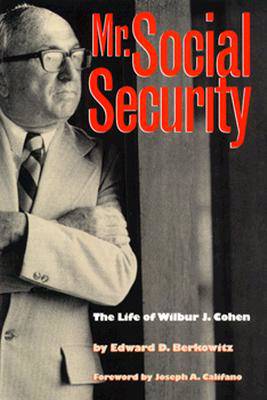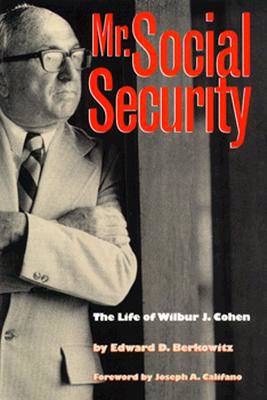
- Retrait gratuit dans votre magasin Club
- 7.000.000 titres dans notre catalogue
- Payer en toute sécurité
- Toujours un magasin près de chez vous
- Retrait gratuit dans votre magasin Club
- 7.000.000 titres dans notre catalogue
- Payer en toute sécurité
- Toujours un magasin près de chez vous
Description
JFK tagged him "Mr. Social Security." LBJ praised him as the "planner, architect, builder and repairman on every major piece of social legislation [since 1935]." The New York Times called him "one of the country's foremost technicians in public welfare." Time portrayed him as a man of "boundless energy, infectious enthusiasm, and a drive for action." His name was Wilbur Cohen.
For half a century from the New Deal through the Great Society, Cohen (1913-1987) was one of the key players in the creation and expansion of the American welfare state. From the Social Security Act of 1935 through the establishment of disability insurance in 1956 and the creation of Medicare in 1965, he was a leading articulator and advocate of an expanding Social Security system. He played that role so well that he prompted Senator Paul Douglas's wry comment that "an expert on Social Security is a person who knows Wilbur Cohen's telephone number."
The son of Jewish immigrants, Cohen left his Milwaukee home in the early 1930s to attend the University of Wisconsin and never looked back. Filled with a great thirst for knowledge and wider horizons, he followed his mentors Edwin Witte and Arthur Altmeyer to Washington, D.C., and began a career that would eventually land him a top position in LBJ's cabinet as Secretary of Health, Education, and Welfare.
Variously described as a practical visionary, an action intellectual, a consummate bureaucrat, and a relentless incrementalist, Cohen was a master behind-the-scenes player who turned legislative compromise into an art form. He inhabited a world in which the passage of legislation was the ultimate reward. Driven by his progressive vision, he time and again persuaded legislators on both sides of the aisle to introduce and support expansive social programs. Like a shuttle in a loom he moved invisibly back and forth, back and forth, until the finely woven legislative cloth emerged before the public's eye.
Nearly a decade after his death, Cohen and his legacy continue to shadow the debates over social welfare and health care reform. While Congress swings with the prevailing winds in these debates, Social Security's prominence in American life remains vitally intact. And Wilbur Cohen is largely responsible for that.
Spécifications
Parties prenantes
- Auteur(s) :
- Editeur:
Contenu
- Nombre de pages :
- 416
- Langue:
- Anglais
Caractéristiques
- EAN:
- 9780700607075
- Date de parution :
- 28-04-95
- Format:
- Livre relié
- Format numérique:
- Genaaid
- Dimensions :
- 161 mm x 237 mm
- Poids :
- 820 g







